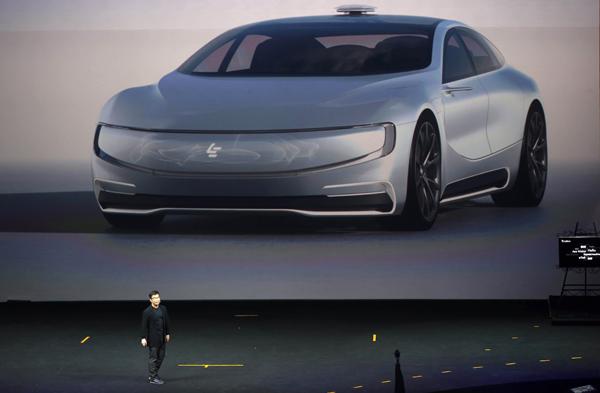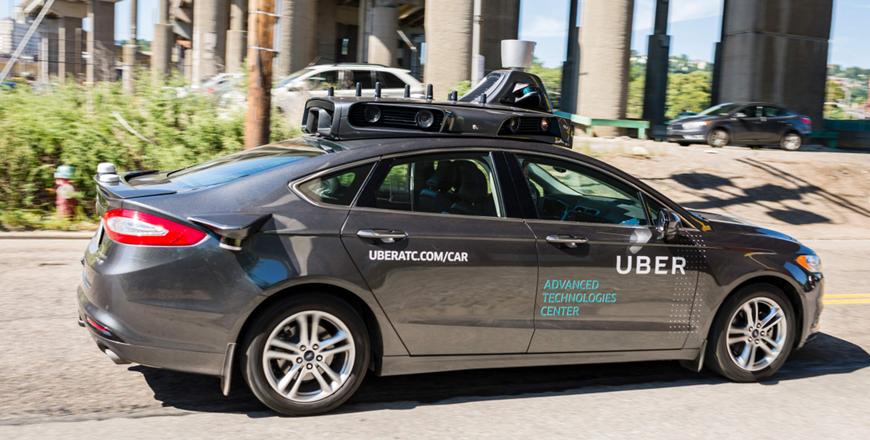You are here
Look Mao, no hands! China’s roadmap to self-driving cars
By Reuters - Apr 23,2016 - Last updated at Apr 23,2016

This photo taken on April 20, 2016, shows Chinese Internet company LeEco Holdings Ltd. unveils its Internet electric battery driverless concept car ‘LeSEE’ during a launch event in Beijing (AFP photo)
BEIJING –– In the race to develop self-driving cars, the US and Europe lead in technology, but China is coming up fast in the outside lane with a regulatory structure that could put it ahead in the popular adoption of autonomous cars on its highways and city streets.
A draft roadmap for having highway-ready, self-driving cars within 3-5 years and autonomous vehicles for urban driving by 2025 could be unveiled as early as this year, said Li Keqiang, an automotive engineering professor at Tsinghua University who chairs the committee drafting the plan. The panel is backed by the powerful ministry of industry and information technology.
The draft will set out technical standards, including a common language for cars to communicate with each other and infrastructure, and regulatory guidelines — a unified framework that contrasts with a patchwork of state laws and standards in the United States.
Without coordination, that patchwork could hold back the development of self-driving cars in the US, David Strickland, a former safety chief for the National Highway Traffic Safety Administration, said at an event in Beijing this month.
China’s top-down approach could see it overtake the US and Europe, where automakers have generally been left to agree among themselves on industry standards. A push for self-driving and electric cars also fits with Beijing’s shift to an economy driven by high-tech and consumer industries rather than heavy industry and low-end manufacturing.
“If we can convince the government that every company, every car on the road must use this [single standard]... then there is a chance China can beat the rest of the world” to the widespread use of self-driving cars, said Li Yusheng, head of Chongqing Changan Automobile’s autonomous drive programme.
China is ripe for the advent of self-driving cars. It’s the world’s biggest autos market and is blighted by choking air pollution, traffic congestion and often erratic driving. More than 200,000 people die each year in road accidents, according to World Health Organisation estimates.
As relative newcomers to mass car ownership Chinese also tend not to share the West’s love affair with driving. In a 2015 World Economic Forum survey, 75 per cent of Chinese said they would likely ride in a self-driving car, versus half of Americans. Within 20 years, China will be the largest market for autonomous features, accounting for at least a quarter of global demand, says Boston Consulting Group.
Big ambitions
The China draft would be opened up for industry comment and input from a range of ministries, ultimately going to the State Council, or Cabinet, for approval.
At a most basic level, the committee will define a “self-driving” car and set a minimum level of functionality, said Bai Jie, a professor at Tongji University who also sits on the expert committee.
In other respects, China plans to be more ambitious. It may adopt cellular data technology — already used in many cars to access the Internet — for cars to communicate, rather than the dedicated short-range communications (DSRC) standard used in the US and Europe, said Li, the panel chairman.
“The US, Europe and Japan spent so much time developing DSRC, so they strongly recommend it for China,” Li said. “Here, we’re just beginning so why not choose advanced technology like LTE (Long Term Evolution wireless broadband technology) or 5G?”
China’s provisional timeline would put it at least in line with, if not ahead, of others developing self-driving cars.
By 2020, Toyota Motor aims to market a car that can drive by itself on highways, and Mercedes, after two decades of research, plans to launch a self-driving car, though drivers would be required to take control in certain situations.
Chinese automakers including SAIC Motor and Ford Motor’s local partner Changan have internal targets that match the likely draft roadmap, and are represented on the experts committee, Li said, while foreign carmakers are not.
Related Articles
WASHINGTON — Engineers, safety advocates and even automakers have a safety message for federal regulators eager to get self-driving cars on
WASHINGTON — The United States unveiled Monday a sweeping new regulatory framework for the unexpectedly rapid rise of self-driving automobil
WASHINGTON/DETROIT — US vehicle safety regulators have said the artificial intelligence system piloting a self-driving Google car coul

















